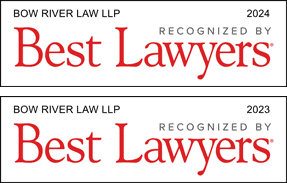- Home
- Services
- Constructive Dismissal
- COVID-19
- Discrimination / Human Rights
- Employee Sued by Employer
- Employment Contracts: Drafting / Review / Negotiation
- Employment Policy Drafting / Review
- Fiduciary Obligations
- Harassment / Bullying
- Independent Contractors
- Just Cause For Termination
- Lay-Offs
- Non-Competition / Non-Solicitation
- Professional Regulation
- Severance Review / Negotiation
- Union / Labour Law
- Workplace Investigations
- Wrongful Dismissal / Unjust Dismissal
- About
- Our Team
- Blog
- Call Now: 587-391-7601
- Contact Us
Union Didn’t Realize Employee Fired = Breach of DFR

Complainant v UFCW Local 401, 2021 CanLii 63313 (ALRB Board File No. GE-08143) is a July 21, 2021 Alberta case in which the United Food and Commercial Workers Local 401 was found to have breached its Duty of Fair Representation (“DFR”) to one of its members by not realizing that the member employee had been fired, which caused them to miss the deadline to file a termination of employment grievance.
This case is interesting because it clarifies the standard of conduct expected of a union towards its members in Alberta and because it is relatively rare for an employee to succeed in a DFR complaint against a union.
Facts
In this case, the relevant employee was injured at work. He made a WCB claim and was put on modified duties as of December 2012. In 2015, the employer determined that the modified duties were going to have to be permanent and that it might not be feasible to provide this accommodation permanently. In February of 2016, WCB provided the employer information suggesting that it was willing to take the injured employee into a vocational training program. The employer determined then that it would terminate the employee’s employment.
On February 25, 2016, the employer had a termination meeting with the employee. However, after the outcome of that meeting the employee did not think his employment had actually been terminated. The next day, the employee told the UFCW that he had been sent home and sent to WCB for vocational training.
In March 2016, the employee received a Record of Employment that stated as reason for leaving, “illness or injury” and then a letter from WCB that stated that “WCB is arranging Vocational Services as you no longer have a job to return to.” The complainant provided these to the union.
The UFCW did not file a termination grievance at that time. The union rep had several verbal conversations with the employer, and testified that he felt there was a possible path for the employee’s return to employment. On June 16, 2016, the union rep asked directly whether they would take the employee back and the employer said no.
On June 17, 2016, the UFCW filed a grievance alleging duty to accommodate. No termination grievance was filed.
Under the collective agreement, grievances must be filed within 14 days of when the basis of the grievance is known or should be known by the parties.
Analysis / Conclusion
Vice Chair Jeremy Schick of the ALRB set out the following as the standard expected of a union under the Duty of Fair Representation in Alberta:
[22] The law surrounding the duty of fair representation under section 153(1) is well established. The Board’s role is to examine and decide whether the Union represented the employee fairly – that is without discrimination, arbitrariness, bad faith or serious negligence. This Board’s decision in Reid v. United Steelworkers of America Local Union No. 7226, [2000] Alta. L.R.B.R. LD-064 (at para. 3) summarizes some of the key principles underlying the duty of fair representation:
- The Union need not take every grievance to arbitration. It need not take a grievance to arbitration just because the grievor asks the Union to do so. The Union is entitled to assess the merits of the grievance, the chances of success at arbitration, the costs of the arbitration process and other factors when deciding whether or not to advance a grievance to arbitration.
- The Board focuses its examination on the Union’s conduct and considerations while the Union represented the employee and in making its decision, rather than on the merits of the grievance, which is the question an arbitrator would answer.
- The Union is entitled to make a wrong decision, as long as it fairly and reasonably investigates the grievance and comes to an informed decision.
- The Union must give the employee a fair opportunity to present the employee’s own case to the Union and to provide input on the results of the Union’s investigation.
- The Union should communicate fairly with the employee about all aspects of its representation. Communication with the employee can play a significant role in representation, but the Union need not take direction from the employee or answer all questions to the employee’s satisfaction, nor must it act within the employee’s time limits.
- A Union does not breach its duty of fair representation just because it reaches a conclusion with which the employee does not agree.
[23] The Board’s Information Bulletin #18 provides a good outline of the issues to be addressed in reviewing a Union’s conduct with respect to the duty of fair representation. The most relevant portions of the Bulletin for this complaint are:
Unions Must Avoid Ill Will
Decisions must not be motivated by ill will. Union officers must not let personal feelings influence whether or how to pursue a grievance. Decisions influenced by personal hostility, revenge or dishonesty may violate the Code.
…
Unions Must Not Discriminate
A union must fairly represent all employees in a bargaining unit. This means a union must not discriminate on the basis of union membership and factors such as, race, religion, sex or age should not influence the way a union handles a grievance. Each member should receive individual treatment. Favouritism and prejudice should play no part in grievance handling. Unions should consider only relevant and lawful matters when deciding whether or not to file or continue grievances.
…
Unions Must Not be Arbitrary
In deciding whether or not to pursue a grievance, a union must avoid arbitrary, capricious, discriminatory or wrongful conduct. It must not act in bad faith.
It is arbitrary to give only superficial attention to the facts or matters in issue. It is arbitrary to decide without concern for the employee’s needs and interests.
…
It is arbitrary not to investigate.
A union should thoroughly investigate all of the facts and evaluate the probable outcome of arbitration before deciding to abandon or settle a grievance. This includes a review of the merits of the grievance and of arbitration decisions for similar grievances.
…
The Board will uphold the union’s decision if it concludes that the union:
- investigated the grievance and obtained full details of the case, including the employee’s side of the story;
- put its mind to the merits of the claim; and
- made a reasoned judgment about the disposition of the grievance.
…
Union’s Right to Consider Other Factors
A union can consider legitimate factors other than the grievor’s interests. For example, the union may have promised the employer that it would not advance a particular interpretation of the contract. Or the union may be concerned that a victory would have an adverse effect on the other employees in the unit.
The ALRB went on to note that the real question about representation was about whether the UFCW’s failure to grieve once it was clear that the employee had been terminated was more than a simple “mistake”, but a matter of “serious negligence” or “gross negligence”, summarizing the cases on the subject as follows:
[31] An excellent summary of a number of authorities dealing with serious negligence was provided by the Board in Leduc v. United Mine Workers of America, Local 2009, [2016] Alta. L.R.B.R. LD-035 at paras 31-33:
31 A myriad of cases across Canada have adopted the position that “mere negligence” is not sufficient to trigger a breach of the duty of fair representation […] As reviewed by Adams at 13-40.2, “gross negligence” was commented upon by the British Columbia Labour Relations Board in Morgan v. Registered Psychiatric Nurses Association of British Columbia, [1980] 1 Can. L.R.B.R. 441, where the Board emphasized that a simple mistake or even handling a matter poorly does not breach the union’s duty. Rather, “it is only when the alleged carelessness reaches that of a blatant or reckless disregard for an employee’s interests that the duty of fair representation will be violated if the trade union is responsible for ‘serious negligence’”. The Ontario Labour Relations Board also looked at gross negligence as opposed to simple negligence. In Prinesdomu v. CUPE, Local 1000 (1975), 75 C.L.L.C. 16,196, the Board states at p. 1354: “flagrant errors in processing grievances – errors consistent with a ‘not caring’ attitude – must be inconsistent with the duty of fair representation.”
32 The Saskatchewan Labour Relations Board reviewed gross negligence in some detail in Hargrave, et. al. v. CUPE, Local 3833, [2003] S.L.R.B.D. No. 47. At paragraph 34 the Saskatchewan Board states:
There have been many pronouncements in the case law with respect to negligent action or omission by a trade union as it relates to the concept of arbitrariness in cases of alleged violation of the duty of fair representation. While most of the cases involve a refusal to accept or to progress a grievance after it is filed, in general, the cases establish that to constitute arbitrariness, mistakes, errors in judgement and “mere negligence” will not suffice, but rather, “gross negligence” is the benchmark. […]
33 Hargrave continues at paragraph 35 citing from the Canada Labour Relations Board decision of Rousseau v. International Brotherhood of Locomotive Engineers, 95 CLLC 220-064. In Rousseau at 143, the Canada Board described arbitrariness as a failure to direct one’s mind to the merits of the matter. It continues and says it is grossly negligent if the conduct is so arbitrary as to display a complete disregard of the consequences:
[…]
The ALRB went on to find that the UFCW had breached its duty of fair representation to the employee member, because while it was appropriate for the union to attempt informal negotiations on behalf of the employee, it should have preserved its ability to grieve the termination once the termination was clear:
[37] In the Board’s view, the answer in this case is reflected not in Mr. Bennett’s subsequent diligent conduct in pursuing his “accommodation” approach. Rather, the answer is found in Mr. Bennett’s initial assessment which led him down that garden path. The failure to competently assess and consider whether something fundamental had changed once evidence of termination was presented to him, and failing to consider whether, while a negotiated “return” might be possible, it was necessary to preserve the right to grieve the termination that had occurred, goes beyond mere negligence. It reflects a reckless approach to an important employee right, simply adopting his preferred approach without adequate consideration of the potential consequences. This is not a simple act of negligence, in the manner of certain failures to file paperwork or certain merely imprudent assessments of the chances of success of a potential grievance. The approach was so seriously or grossly negligent that it reflects a reckless attitude towards the Complainant’s interests, which cannot be permissible under the Code. [underline added]
[38] Accordingly, the Board finds a breach of the duty of fair representation in these circumstances.
My Take
The standard of representation expected of a trade union to discharge its Duty of Fair Representation to its members is not high. A union can make several mistakes and, frankly, do a poor job in advancing the interests of its members or keeping the members informed, and it is usually not enough for a finding that it has breached its DFR to that member.
The reason for this low bar is the legal presumption that a union is trying to advance the interests of its members as a group, has limited resources, and has to have some autonomy from external scrutiny in order to operate properly.
However, in my view that reality must be balanced with the individual members’ rights. Individual union members often have no choice but to “go with” the union, and often are not permitted to sue their employers directly. As such, when the union does a really poor job representing a member employee, some level of accountability is appropriate.
I think ALRB Vice Chair Jeremy Schick’s finding of a DFR breach on these facts is refreshing.
Here is a link to this Alberta labour law decision: https://www.canlii.org/en/ab/ablrb/doc/2021/2021canlii63313/2021canlii63313.html?autocompleteStr=2021%20CanLii%2063313%20&autocompletePos=1
Let Us Help You
Bow River Law is an Alberta employment law firm headed by Joel Fairbrother and Sarah Coderre. Also on our team is our associate lawyer Kim Holland. We are all skilled and experienced in employment law, labour law, human rights, harassment issues, and just about any other legal matter affecting the workplace. If you are an employer or an employee in need of legal advice or representation, let us help you.


